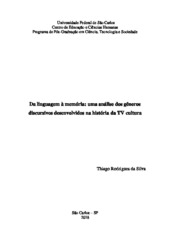| dc.contributor.author | Silva, Thiago Rodrigues da | |
| dc.date.accessioned | 2018-05-16T23:53:57Z | |
| dc.date.available | 2018-05-16T23:53:57Z | |
| dc.date.issued | 2018-02-27 | |
| dc.identifier.citation | SILVA, Thiago Rodrigues da. Da linguagem à memória: uma análise dos gêneros discursivos desenvolvidos na história da TV Cultura. 2018. Dissertação (Mestrado em Ciência, Tecnologia e Sociedade) – Universidade Federal de São Carlos, São Carlos, 2018. Disponível em: https://repositorio.ufscar.br/handle/ufscar/10050. | * |
| dc.identifier.uri | https://repositorio.ufscar.br/handle/ufscar/10050 | |
| dc.description.abstract | Television has acquired the power to influence the development of subjects with a high level of reach in the social categories of individuals providing simultaneous communication to different places. With these characteristics, TV Cultura reaches worldwide appreciation for the enrichment that it provides to society under a narrative that is considered synonymous with commitment to the creation of a program that values to serve the varied population and that surpasses the objectives established by the market. The research proposed here aimed to analyze the way in which TV Cultura seeks to construct its statements, recognized as discursive genres. The television channel that is born with the mission to constitute opinion-forming individuals, diffusers of knowledge and culture can reproduce their intentions through the choice of their speech mode, bringing the hypothesis that the reasons that make the broadcaster able to have its productions remembered by the population are the genres that it presents. For the recognition of these marks of the programming constructed by the channel, the paths developed by Mikhail Bakhtin are used to establish the relation of the language with its surroundings and proposing as a method the comparison that allows to recognize other voices and texts capable of materializing the link between the television and society. Discursive genres become sources of knowledge through the language that reaches the viewer and it is from this language, which is considered important for the viewers, is what makes memory present, consolidated in the desire to keep the programming alive and in the molds that made it recognized as quality. The search for a political, social and cultural analysis of the situation and history of the channel is fundamental so that one can understand how it is possible to establish a quality public television network and that it can actually fulfill its paper. | eng |
| dc.description.sponsorship | Coordenação de Aperfeiçoamento de Pessoal de Nível Superior (CAPES) | por |
| dc.language.iso | por | por |
| dc.publisher | Universidade Federal de São Carlos | por |
| dc.rights.uri | Acesso aberto | por |
| dc.subject | Linguagem | por |
| dc.subject | Gêneros do discurso | por |
| dc.subject | TV Cultura | por |
| dc.subject | Memória | por |
| dc.subject | Language | eng |
| dc.subject | Discursive genres | eng |
| dc.subject | TV Cultura | eng |
| dc.subject | Memory | eng |
| dc.title | Da linguagem à memória: uma análise dos gêneros discursivos desenvolvidos na história da TV Cultura | por |
| dc.title.alternative | From language to memory: na analysis of discursuve genres developed in the history of TV Cultura | eng |
| dc.type | Dissertação | por |
| dc.contributor.advisor1 | Miotello, Valdemir | |
| dc.contributor.advisor1Lattes | http://lattes.cnpq.br/9131819326282708 | por |
| dc.description.resumo | A Televisão adquiriu o poder de influenciar a formação dos sujeitos com um grande nível de alcance as categorias sociais de indivíduos proporcionando comunicação simultânea para diferentes lugares. Com essas características, a TV Cultura atinge valorização mundial pelo enriquecimento que proporciona à sociedade sob uma narrativa que é considerada sinônimo de comprometimento com a criação de uma programação que preza por atender a população variada e que ultrapassa os objetivos estabelecidos pelo mercado. A pesquisa aqui proposta teve como objetivo analisar o modo em que a TV Cultura procura construir os seus enunciados, reconhecidos como gêneros do discurso. O canal de televisão que nasce com a missão de constituir indivíduos formadores de opinião, difusores de conhecimento e de cultura consegue reproduzir suas intenções através da escolha do seu modo de fala, trazendo a hipótese de que os motivos que tornam a emissora capaz de ter suas produções lembradas pela população são os gêneros que ela apresenta. Para o reconhecimento dessas marcas da programação construída pelo canal, usa-se os caminhos desenvolvidos por Mikhail Bakhtin para estabelecer a relação da linguagem com o seu entorno e propondo como método o cotejamento que permite reconhecer outras vozes e textos capazes de materializar o vínculo entre a televisão e a sociedade. Gêneros discursivos se tornam fontes de conhecimento por meio da linguagem que chega até o telespectador e é a partir dessa linguagem, que é considerada importante para os telespectadores é que a memória de faz presente, consolidada no desejo de manter a programação viva e nos moldes que a fizeram ser reconhecida como de qualidade. A busca por fazer uma análise política, social e cultural sobre o olhar que se volta para a situação e história do canal é fundamental para que se possa compreender como é possível estabelecer uma rede de televisão pública de qualidade e que realmente consegue cumprir com o seu papel. | por |
| dc.publisher.initials | UFSCar | por |
| dc.publisher.program | Programa de Pós-Graduação em Ciência, Tecnologia e Sociedade - PPGCTS | por |
| dc.subject.cnpq | LINGUISTICA, LETRAS E ARTES::LINGUISTICA | por |
| dc.ufscar.embargo | Online | por |
| dc.publisher.address | Câmpus São Carlos | por |
| dc.contributor.authorlattes | http://lattes.cnpq.br/2655083257352540 | por |
